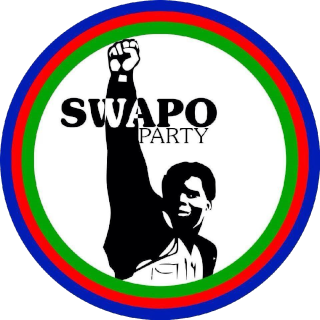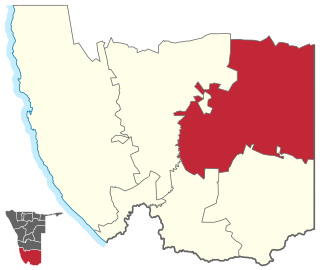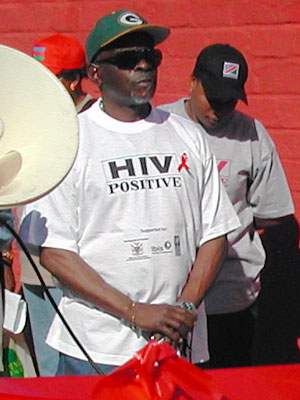| |||||
| Decades: | |||||
|---|---|---|---|---|---|
| See also: | |||||
2009 in Namibia refers to the events which occurred and will occur in the year of 2009 in the Republic of Namibia.
| |||||
| Decades: | |||||
|---|---|---|---|---|---|
| See also: | |||||
2009 in Namibia refers to the events which occurred and will occur in the year of 2009 in the Republic of Namibia.
President Hifikepunye Pohamba declared a state of emergency in much of Northern Namibia on 19 March following the deaths of 90 people due to flooding. The flooding was considered some of the worst in memory and food shortages were possible. Thousands were displaced. [1]
An oil spill occurred off the coast of Lüderitz in the Atlantic Ocean in April.
In January, the International Monetary Fund predicted economic growth would drop by 50% in 2009, from 4% to 2% due to the global recession. [2] Projections were cut again in March, down to 1.2% growth, according to Minister of Finance Saara Kuugongelwa. This was credited to a decrease in mining activities across the country. [3]
President Pohamba and other members of the ruling SWAPO party led celebrations in Keetmanshoop, ǁKaras Region on 21 March 2009. 21 March marked the 19th year of independence.
The 2009 general election will take place in November. Namibians outside of the country will be able to vote on 13 November, while the election dates inside of the country will 27–28 November. [4] Two candidates, current President Hifikepunye Pohamba of the SWAPO party and former cabinet minister Hidipo Hamutenya of the Rally for Democracy and Progress were confirmed by their party's as candidates for president for the election while other parties were expected to announce their candidates later in the year.
On 2 January, boxer Paulus Moses beat Yusuke Kobori of Japan to win the World Boxing Association (WBA) lightweight title. [5]
In March, the Namibia national cricket team lost twice to Zimbabwe at Wanderers Stadium in South Africa. [6]
In May, 4 Deserts will host RacingThePlanet: Namibia 2009, which is a 7-day, 6 stage footrace between Keetmanshoop and Lüderitz in ǁKaras Region, southern Namibia. [7]
The Namibia national rugby union team qualified for the 2011 Rugby World Cup by sweeping matches against Tunisia. [8]
The Namibia national football team, also known as the Brave Warriors, played in Beirut against Lebanon on 1 April and in Luanda against Angola on 4 April in the seventh annual peace celebrations, which marked the end of the Angolan Civil War. [9]
The Namibian Newspaper Cup was held from 10 to 13 April at Sam Nujoma Stadium in Katutura, Windhoek. [10]
The history of Namibia has passed through several distinct stages from being colonised in the late nineteenth century to Namibia's independence on 21 March 1990.

The South West Africa People's Organisation, officially known as the SWAPO Party of Namibia, is a political party and former independence movement in Namibia. Founded in 1960, it has been the governing party in Namibia since the country achieved independence in 1990. The party continues to be dominated in number and influence by the Ovambo ethnic group.

Samuel Shafiishuna Daniel Nujoma, is a Namibian revolutionary, anti-apartheid activist and politician who served three terms as the first President of Namibia, from 1990 to 2005. Nujoma was a founding member and the first president of the South West Africa People's Organization (SWAPO) in 1960. Before 1960, SWAPO was known as the Ovambo People's Organisation (OPO). He played an important role as leader of the national liberation movement in campaigning for Namibia's political independence from South African rule. He established the People's Liberation Army of Namibia (PLAN) in 1962 and launched a guerrilla war against the apartheid government of South Africa in August 1966 at Omugulugwombashe, beginning after the United Nations withdrew the mandate for South Africa to govern the territory. Nujoma led SWAPO during the lengthy Namibian War of Independence, which lasted from 1966 to 1989.

The ǁKharas Region is the southernmost, largest, and least densely populated of the 14 regions of Namibia; its capital is Keetmanshoop. The name assigned to the region reflects the prominence of the Karas mountain range in its southern part. The ǁKharas region contains the municipality of Keetmanshoop, the towns Karasburg, Lüderitz and Oranjemund, and the self-governed villages Aroab, Berseba, Bethanie, Koës and Tses.

Keetmanshoop Rural is an electoral constituency in the ǁKaras Region of Namibia. It contains the Krönlein suburb of Keetmanshoop and the villages of Koës and Aroab, the settlements of Seeheim and Klein Karas, as well as several farming communities in the area. The constituency office is situated in Aroab. Keetmanshoop Rural had a population of 7,219 in 2011, up from 6,399 in 2001. As of 2020 the constituency had 6,398 registered voters.
Hidipo Livius Hamutenya was a Namibian politician. Veteran politician Hidipo Hamutenya died at 77 after a short illness. A long-time leading member of the South West Africa People's Organization (SWAPO), Hamutenya was a member of the Cabinet of Namibia from independence in 1990 to 2004, serving in several important ministerial portfolios. He was defeated in a bid for the party's presidential nomination in 2004 and left SWAPO to form an opposition group, the Rally for Democracy and Progress (RDP), in 2007. He was elected to the National Assembly of Namibia with RDP in the 2009 general election. He was forced to step down as RDP president on 28 February 2015 and rejoined SWAPO on 28 August 2015.

Hifikepunye Lucas Pohamba is a Namibian politician who served as the second president of Namibia from 21 March 2005 to 21 March 2015. He won the 2004 presidential election overwhelmingly as the candidate of SWAPO and was reelected in 2009. Pohamba was the president of SWAPO from 2007 until his retirement in 2015. He is a recipient of the Ibrahim Prize.

Nahas Gideon Angula is a Namibian politician who served as the third Prime Minister of Namibia from 21 March 2005 to 4 December 2012. He was succeeded by Hage Geingob in a cabinet reshuffle after the 2012 SWAPO Party congress. He subsequently served as Minister of Defence from 2012 to 2015.
Ben Ulenga is a Namibian trade unionist, politician, and diplomat. In the 1990s, he served under the SWAPO government as a deputy minister and as an ambassador, but he left SWAPO in 1998 and founded an opposition party, the Congress of Democrats (CoD), in 1999. He was a member of the National Assembly of Namibia from 2000 to 2015 and led the CoD until 2015.
Gibeon is a village in Gibeon Constituency in the Hardap Region of Namibia.
Pendukeni "Penny" Iivula-Ithana is a Namibian politician who served as the secretary general of SWAPO, Namibia's ruling party, from 2007 to 2012. She was a member of the Constituent Assembly of Namibia in 1989 and has been a member of Parliament and member of cabinet since independence in 1990.

General elections were held in Namibia on 27–28 November 2009. They were the fourth general elections since independence and the fifth democratic elections. Voting ended on 28 November and official election results, released on 4 December, showed that Hifikepunye Pohamba and his SWAPO Party were re-elected, each with over 75% of the vote. Prior to the election, the South West Africa People's Organization (SWAPO) was widely expected to score a landslide victory, with the Rally for Democracy and Progress (RDP) considered SWAPO's biggest challenger. Fourteen political parties competed for seats in the National Assembly of Namibia, and twelve candidates ran for the presidency.

Nangolo Mbumba is a Namibian politician who is the fourth and current president of Namibia. He became president after the death of Hage Geingob, under whom he had served as the second Vice-president of Namibia from 2018 to 2024.
The following lists events that happened during 2008 in Namibia.
Lieutenant General Martin Shalli is a former Namibian diplomat and military commander. In 2005, he was appointed as Namibia's High Commissioner to Zambia by President Sam Nujoma, but he was recalled in October 2006 by Nujoma's successor, Hifikepunye Pohamba, and appointed as Chief of the Namibia Defence Force (NDF). He replaced controversial NDF commander Solomon Huwala, and he was replaced as High Commissioner to Zambia by regional councillor Solomon Witbooi.
Nikolaus Onverwag 'Niko' Bessinger was a Namibian politician and independence activist.

Brazil and Namibia established diplomatic relations in 1990. Both nations are members of the Group of 77 and the United Nations.
Ida Jimmy ǃHa-Eiros (1945–2024) was a Namibian independence activist and SWAPO politician. She is considered a national heroine of Namibia. Jimmy was born on 16 November 1945 in Lüderitz, South West Africa.